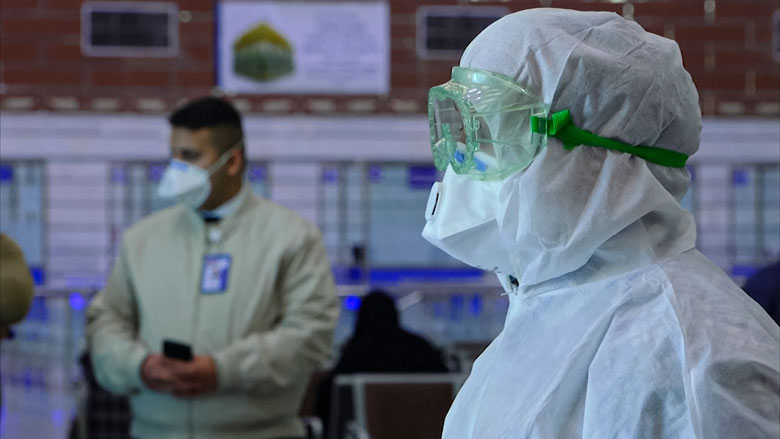Baghdad is Stuck in The Middle of a Washington-Tehran Rivalry

Baghdad has become the centre of a tug of war between Washington and Tehran, but it's trying its best to maintain a balance between the two rivals while pursuing its own interests.
Invaded by the US in 2003, and then enduring the presence of Daesh between 2014 and 2017 and defeating the terror outfit with the help of Tehran-backed militia Hash al Shaabi, Iraq now finds itself entangled between the competing foreign policies of the US and Iran.
For Baghdad, picking one side and dumping the other could have serious consequences. While the US has its troops in the country and played a crucial role in shaping its political establishment, Iran has gained significant influence in Iraq through its militias and trade volume.
When Washington abruptly restored crippling sanctions against Iran in May 2018, the Iraqi government was required to strike a fine balance to maintain friendly ties with both the countries.
“This escalation’s hurting the entire region, not only Iran to be fair and this is not a happy situation for any of the actors in the region to start with. It’s best to de-escalate,” said Iraqi President Barham Salih in reaction to the sanctions.
"We cannot afford our country to be dragged into conflict," he added.
But the US has long been asking Iraq to take steps to curb Iranian influence in the country. In 2017, Washington demanded Iran-backed militias to be cleared from Iraq despite the Iraqi parliament passing legislation in 2016 legitimising the Hashd al Shaabi (PMF) forces as an independent organisation within the Iraqi army.
A year later, the US sanctions made a comeback, this time asking Iraq to stop purchasing Iranian energy — a forceful request for Baghdad, which is largely dependent on Iranian energy and goods. The US extended the waiver until the end of the summer, but asked the country to find alternatives before the September 15 deadline.
“Iraqi politics in general is not laid back and crisis come in bundles, but the sanctions have added an additional layer of pressure. Given that Iraq can’t forego importing many Iranian products, at least on the short and middle-term, the sanctions have made trade with Iran cumbersome,” Muhammad al Waeli, an Iraq analyst focusing on leadership and reform in Iraq, said.
Iraq's politics continues to be fragile with its new government still facing recurring protests in the southern provinces. The government is yet to set up a cabinet more than a year after its elections and faces local issues ranging from frequent power outages in scorching summers to poor water supplies.
For Ali Talib, a 26-year-old activist from Basra, which is the center of demonstrations in the south, says the risk of facing power cuts is beyond worrying.
“The electric power plants in Basra operate with Iranian fuel and because the system of electric power distribution in Iraq is tied to Basra, many provinces are dependent on [its grid system]," Talib said.
Waeli said that while many people in the country claim that former prime minister Haider al Abadi displayed weak leadership toward resisting the US-imposed sanctions on Iran, which eventually costed him the premiership, the new leadership could not defy American pressure.
Despite the growing antagonism toward the US in Iraq, said Waeli, the new Iraqi government complied with the sanctions against Iran.
The Iraqi government however is treading cautiously, neither openly agreeing to American demands, nor rejecting them. One of the displays of Baghdad's smooth diplomatic maneuvering came in the form of Prime Minister Adil Abdul Mahdi reining in the Hashad al Shaabi militia by fully integrating it into the Iraqi army, a move aimed at addressing Washington's concerns over the militia.
Although Iraq is trying hard not to lose either of its two allies, Waeli urged caution.
“Many indicators point to its likelihood, that any conflict between these two powers might take place, at least partially, on Iraqi soil and will, in any case, have a catastrophic impact on Iraq,” he said.
Now with mounting US pressure forcing Iraq to comply with its sanctions against Iran, Iraqi trade has already taken a hit. Instead of trading in all commercial sectors, the country is only purchasing essential supplies, including food, vital gas and electricity, through a 'special purpose vehicle' established to trade in Iraqi Dinars and to bypass the sanctions.
According to Waeli, Iran in the past was reluctant to use American dollars in exchange for energy, but after the sanctions, it has changed that policy.
Hussein Ali, who manages a women's clothing shop in Iraq’s holy city of Najaf, confirmed witnessing cross border trade between Iran and Iraq even after the US renewed its sanctions against Tehran.
The consequences of this economic war were felt in the city, which used to attract millions of Iranian Shia pilgrims every year during the pre-sanction period. Now half the city is empty.
“The turnout of Iranian customers to Iraq has dropped significantly, and it has a negative impact on the economic situation in Iraq with a significant decrease in income,” Hussein said.
For Hussein, Iraq cannot afford to hurt its relations with Iran, as the two countries are dependent on each other for everything from trading yoghurt to watermelons. At the same time he also understands the importance of keeping Americans happy.
“Not because I love Iran, or the US government but the Iraqi government must find a balance between them. It’s for our own benefit,” he said.
Waeli said Iraq’s balancing act between the two powers has proven complicated and failed in many instances.
"Instead of seeking to please Iran or the US, Iraq will be better off in actively seeking its own interests. This however cannot happen effectively if Iraq doesn’t first strengths itself internally, identifies clearly where its interests lie, curb unwanted foreign intervention, and pursue its interests more actively," he added.
This article has been adapted from its original source.

